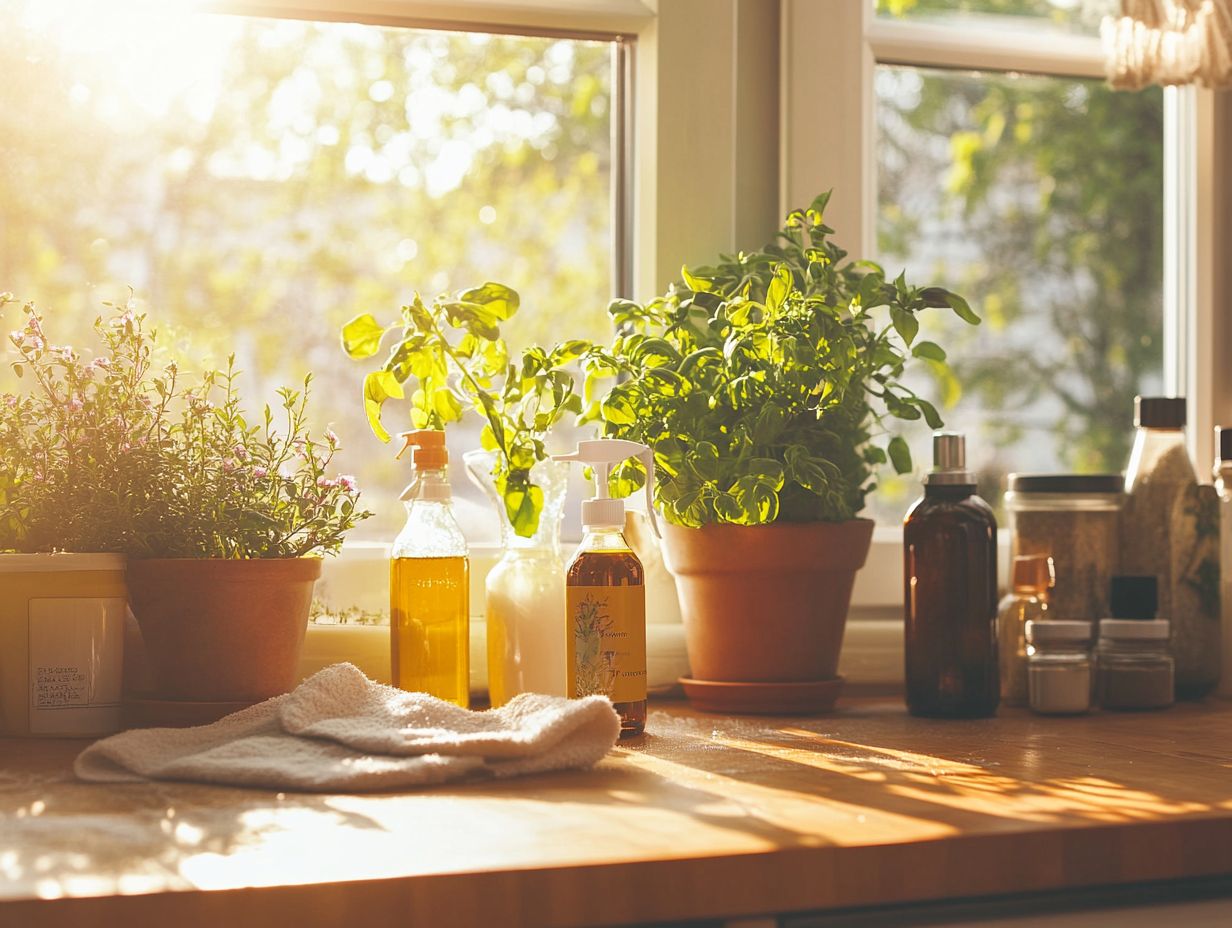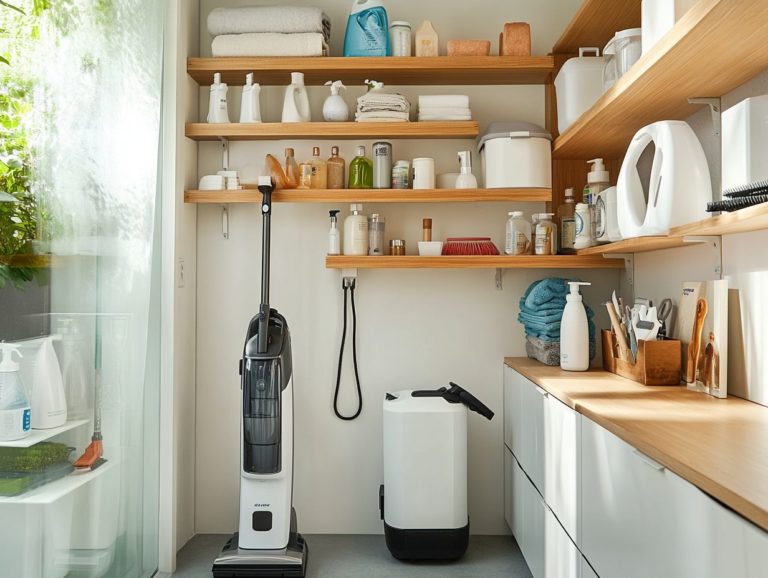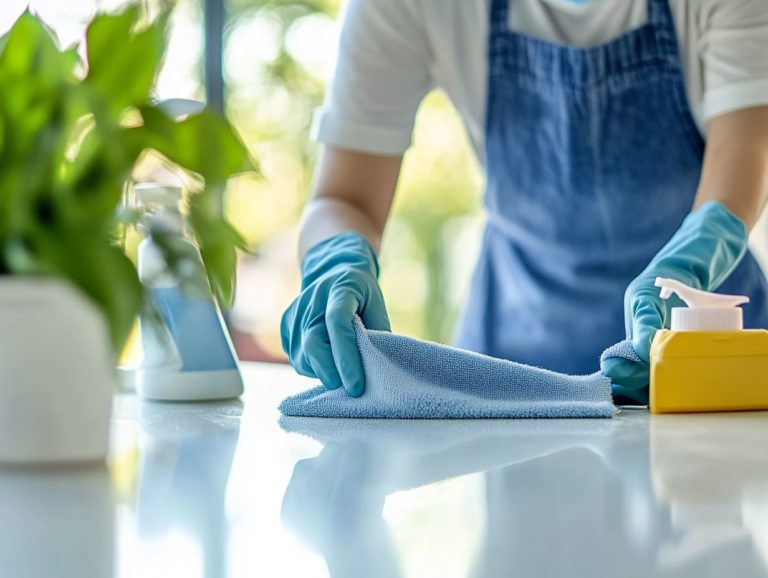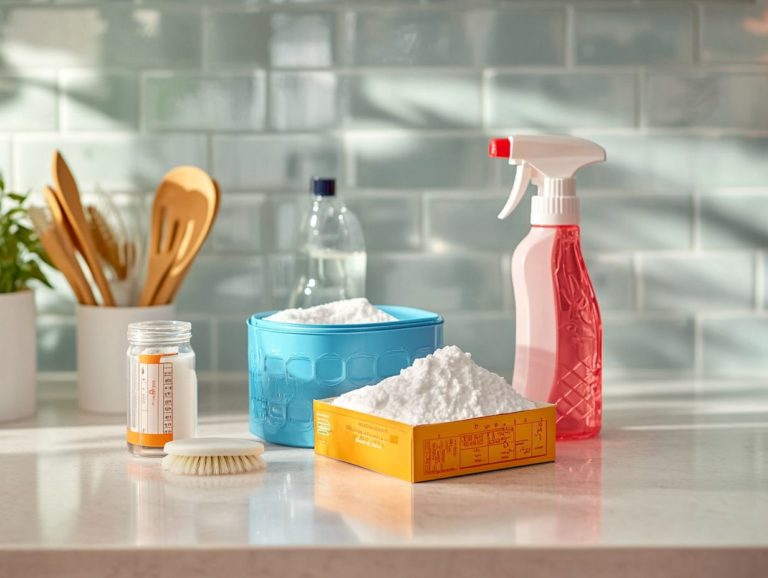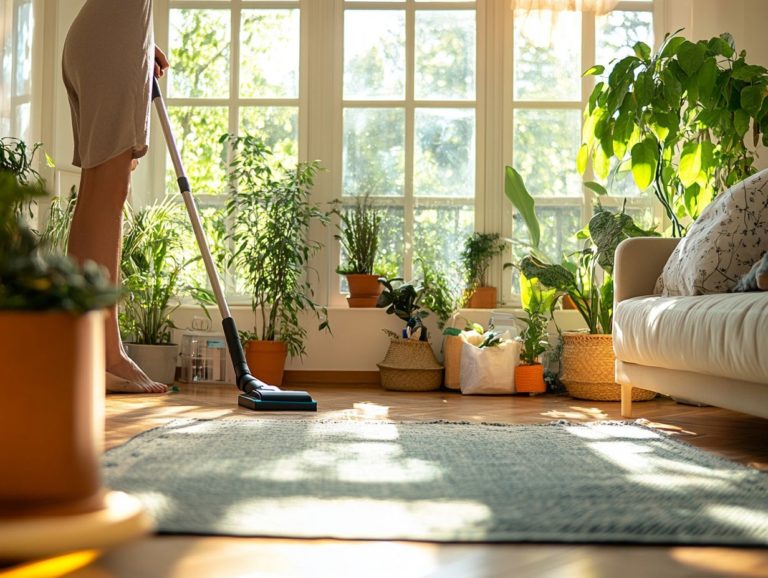5 Essential Tips for Green Cleaning
In a world that’s becoming ever more conscious of environmental issues, embracing green cleaning practices and eco-friendly cleaning methods can have a profound impact on both your home and the planet.
This article will guide you through five essential tips for making the transition to eco-friendly cleaning methods. You ll uncover the advantages of using natural cleaning products, learn how to craft your own natural cleaning solutions, and discover why opting for reusable cleaning tools is a smart choice that benefits both your wallet and the environment.
We ll delve into the significance of proper disposal methods, sustainable cleaning practices, and highlight the perks of using microfiber cloths. Embark on this journey toward a cleaner, greener home, and make a difference that resonates far beyond your doorstep.
Contents
- Key Takeaways:
- 1. Use Natural Cleaning Products
- 2. Make Your Own Cleaning Solutions
- 3. Switch to Reusable Cleaning Tools
- 4. Use Microfiber Cloths Instead of Paper Towels
- 5. Properly Dispose of Hazardous Cleaning Products
- Why Should You Consider Switching to Green Cleaning?
- Frequently Asked Questions
- What are the benefits of using green cleaning products?
- What are the five essential tips for green cleaning?
- How can I make my own green cleaning products?
- Why is reducing water usage important in green cleaning?
- What should I do with hazardous chemicals when cleaning?
- How can I ensure my cleaning products are truly green?
Key Takeaways:
1. Use Natural Cleaning Products
Using natural cleaning products is crucial for maintaining a healthy home environment. By minimizing harmful chemical exposure, you enhance indoor air quality and promote sustainable cleaning practices. When you choose eco-friendly products that are free from toxic substances, you re not just looking out for your own health; you re also addressing environmental concerns. Incorporating biodegradable options into your cleaning routine can significantly reduce household waste and plastic waste, ensuring that your efforts align with the green cleaning movement championed by experts like Lauren Krueger.
Switching to brands that prioritize natural ingredients, such as Seventh Generation and Method, enables you to eliminate the toxicity often found in conventional cleaners while supporting companies dedicated to sustainability. These products typically feature plant-derived formulas, making them safer for children and pets who may have sensitive health needs. By reducing harmful chemicals in your home, you can help create a healthier indoor environment, fostering better respiratory health and overall well-being. Additionally, using natural deodorizer like essential oils can further enhance indoor environments.
As more individuals like you embrace eco-friendly cleaning solutions, a positive ripple effect emerges, encouraging biodiversity and cleaner waterways for future generations.
2. Make Your Own Cleaning Solutions
Creating your own natural cleaning solutions is not only a cost-effective strategy, but it also allows you to maintain a pristine home while steering clear of the harmful chemicals commonly found in traditional cleaning products. This approach also reduces packaging waste and aligns with sustainable habits.
By embracing simple ingredients like vinegar and baking soda, you not only safeguard your health but also contribute to a healthier planet. These natural alternatives excel at tackling grime and odors, demonstrating that safe cleaning can be both straightforward and effective. For instance, vinegar cleaning recipes are excellent for various household tasks.
For example, a mixture of vinegar and water serves as an outstanding window cleaner and all-purpose cleaner, while baking soda acts as a formidable scrub for those stubborn stains.
Utilizing these easily accessible ingredients promotes sustainable habits by significantly reducing the packaging waste typically associated with store-bought cleaners. In this article, you’ll discover several easy-to-follow recipes for DIY cleaning solutions that will elevate your cleaning game without any compromises.
3. Switch to Reusable Cleaning Tools
Switching to reusable cleaning tools is a crucial step in your journey to reduce waste and elevate your cleaning routine to an eco-friendly option. This choice offers a sustainable alternative to those single-use products that clutter both your space and the planet. By using these tools, you ll make a big difference in reducing waste!
By incorporating options like microfiber cloths and washable cleaning pads, you not only enhance the efficiency of your cleaning tasks across various surfaces but also significantly reduce plastic consumption. Microfiber cloths, for instance, are designed to catch dust, dirt, and allergens far more effectively than traditional materials, ensuring a thorough clean without the reliance on harsh chemicals.
Similarly, washable cleaning pads are the gift that keeps on giving; you can use them repeatedly, enjoying a durable solution that holds its effectiveness over time. By making these mindful choices, you contribute to a cleaner environment, supporting recycling efforts while reveling in the advantages of powerful and sustainable cleaning methods.
4. Use Microfiber Cloths Instead of Paper Towels
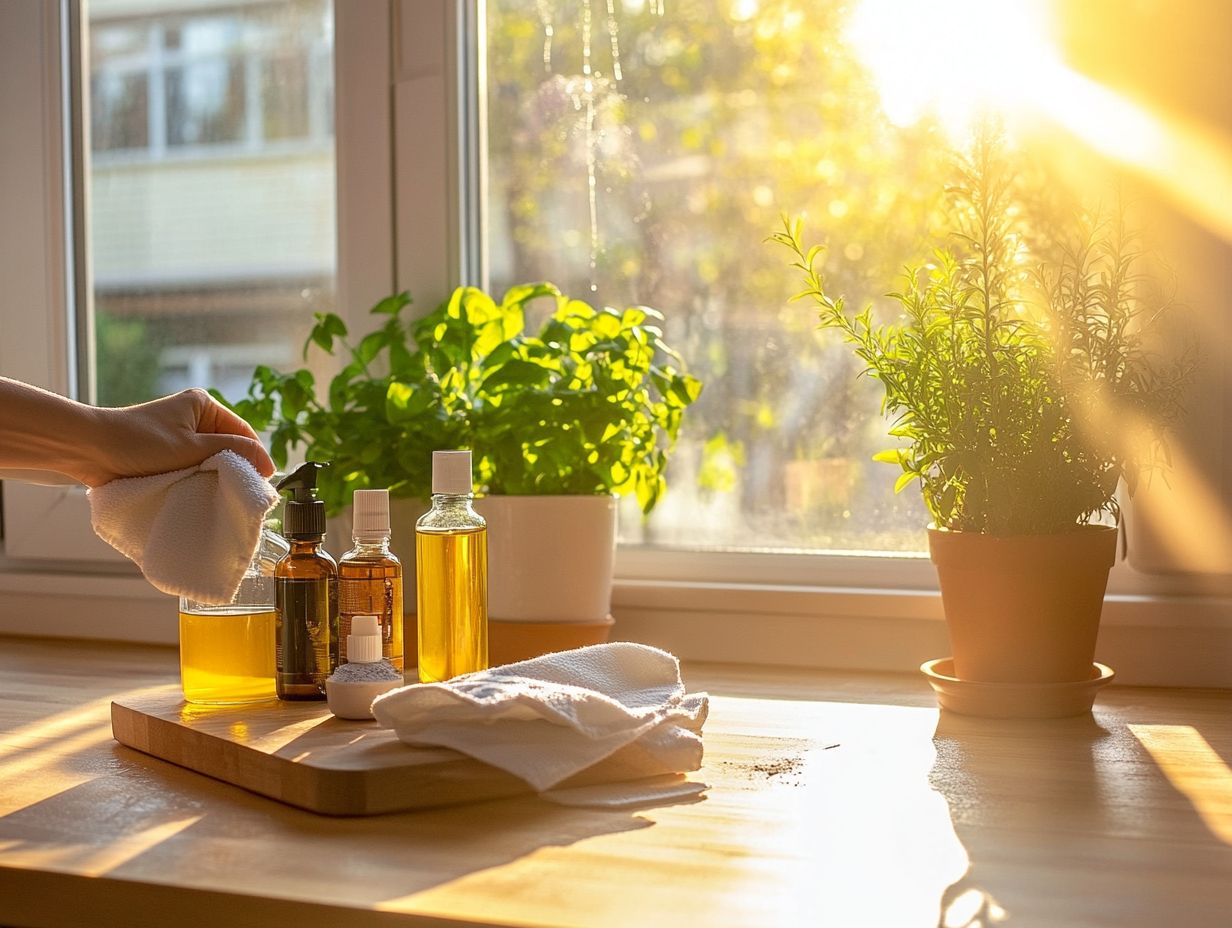
Using microfiber cloths instead of paper towels for cleaning surfaces is more than just an eco-friendly choice; it’s a highly effective method that plays a significant role in reducing household waste.
These versatile cleaning tools are designed to catch dust, dirt, and allergens more efficiently than traditional paper towels, thanks to their microscopic fibers that create a larger surface area for absorption. Unlike disposable options, microfiber cloths can be washed and reused hundreds of times, drastically cutting down on the resources required for paper production.
You can pair them with gentle cleaning solutions for the best results.
By embracing this sustainable practice, you not only lessen your own environmental footprint but also inspire those around you to consider eco-friendly habits. Transitioning to microfiber can spark a collective movement toward more responsible cleaning solutions, ultimately contributing to a healthier planet for future generations.
5. Properly Dispose of Hazardous Cleaning Products
Properly disposing of hazardous cleaning products is essential for safeguarding your health and the environment. When these products are disposed of incorrectly, the risk of contamination and exposure to harmful chemicals increases significantly. Consider using reusable containers for proper disposal.
By adhering to local regulations, you not only contribute to community safety but also help preserve the ecological balance, preventing toxic substances from leaching into soil and water systems. It s crucial to know these terms to protect yourself and the environment! Familiarize yourself with warning labels and Safety Data Sheets (SDS), which are sheets that provide information on the properties of hazardous materials, to identify potentially hazardous materials keep an eye out for terms like corrosive, toxic, or flammable. For further guidance, consider referencing sources like Mongabay or Better Homes & Gardens.
Instead of relying on traditional products, consider opting for eco-friendly alternatives such as vinegar, baking soda, or commercially available green cleaning solutions that are biodegradable and non-toxic. These options are gentler on the environment and safer for your household, allowing you to maintain a clean space without compromising your well-being. Experts like Annie Berthold-Bond and Linda Mason Hunter often advocate for these sustainable cleaning strategies.
Why Should You Consider Switching to Green Cleaning?
Switching to green cleaning practices enhances your personal health by reducing your exposure to harmful chemicals. It also significantly benefits the environment and encourages sustainable habits that uplift the community as a whole. Using energy-efficient appliances along with these practices can further reduce your ecological footprint.
By embracing eco-friendly cleaning products, you cultivate a safer home atmosphere. This promotes better indoor air quality and can lower the risk of respiratory issues and allergies. Using non-toxic cleaners helps minimize water contamination and reduces your overall ecological footprint. Don t miss out on the benefits of essential oils as natural air fresheners to further enhance your indoor environments.
To adopt these practices effectively, consider using vinegar and baking soda as powerful cleaning agents. Explore brands like Seventh Generation and Method, which lead in green cleaning innovation. Additionally, you can follow the 5 best practices for making homemade cleaners to enhance your green cleaning efforts. Decluttering your space and using sustainable materials can also boost your initiatives.
Influential figures in this movement, such as Marie Kondo, highlight the significance of sustainability in daily cleaning routines. This makes it easier for you to align your household management with environmentally conscious values. Similarly, Alison Haynes and Stephanie Moram advocate for environmentally friendly cleaning systems and practices.
Why Choose Natural Cleaning Products?
Natural cleaning products offer fantastic benefits! You’ll enjoy improved indoor air quality, lower health risks associated with toxic chemicals, and a reduced impact on the environment compared to traditional cleaning solutions. Incorporating products from eco-conscious brands like Green Earth can further support your sustainable choices.
These eco-friendly alternatives minimize your exposure to harsh chemicals, which can lead to respiratory issues and skin irritations. They also contribute to a healthier home overall. Research suggests that households using natural cleaners experience a 30% decrease in allergy-related symptoms. This is particularly beneficial for homes with children or pets, who are more susceptible to the adverse effects of toxic chemicals.
Many natural cleaning agents, such as vinegar and baking soda, break down naturally in the environment and do not pollute waterways like their synthetic counterparts, making them a more sustainable choice for your home. Experts frequently recommend these products, especially for families with children or pets, who are particularly vulnerable to harmful substances. Using reusable cleaning cloths can further enhance the eco-friendly aspect of your cleaning routine.
By opting for natural options, you actively protect the health of your loved ones while contributing to a cleaner planet.
How Can You Make Your Own Cleaning Solutions?
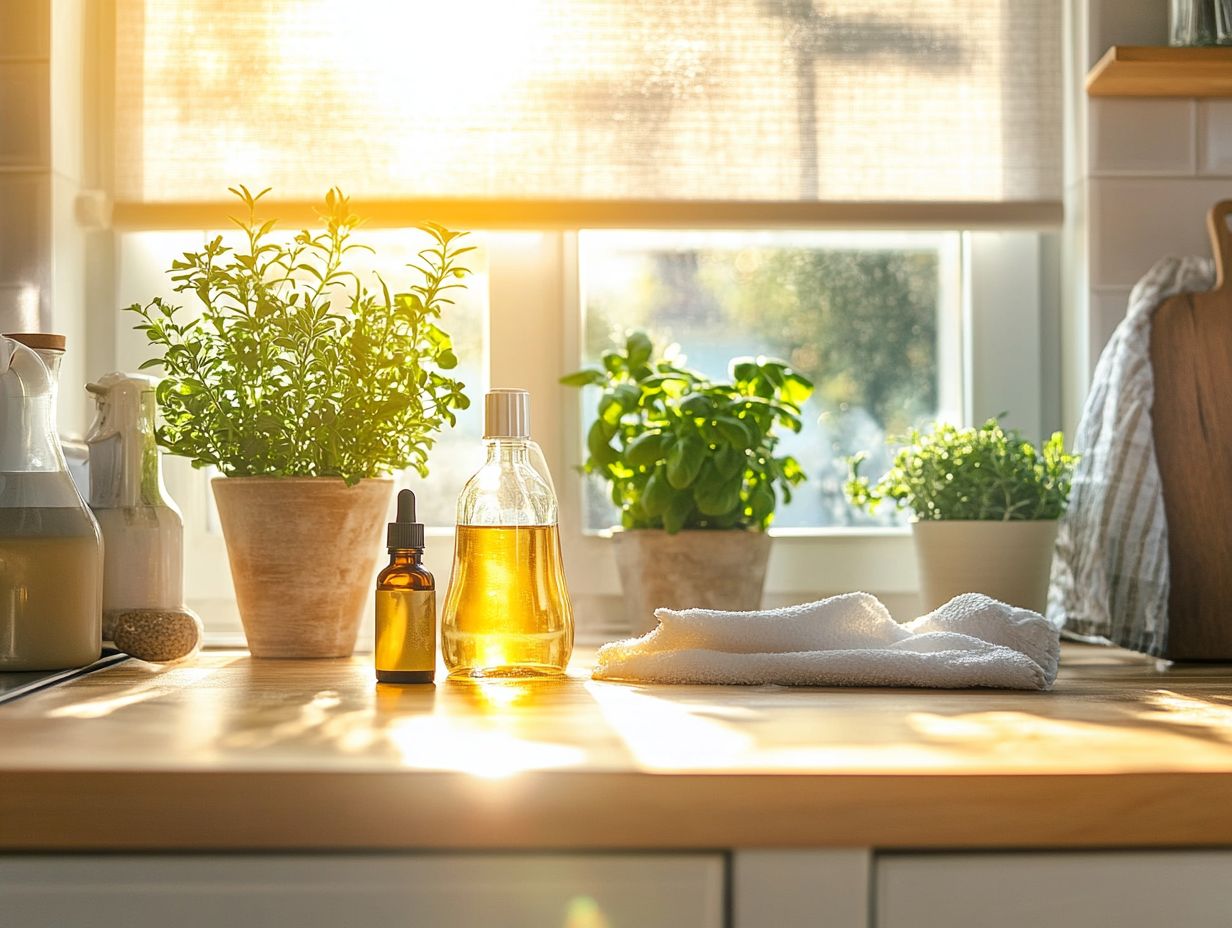
Creating your own cleaning solutions is remarkably simple! You can tailor your cleaning products with natural ingredients like vinegar and baking soda, providing an eco-friendly alternative to commercial options. These homemade solutions serve as gentle cleaning solutions, perfect for maintaining a safe and healthy home environment.
These natural ingredients are readily available and budget-friendly, making them ideal for anyone eager to embrace a more sustainable lifestyle. For example, vinegar cleaning is a potent disinfectant, adept at cutting through grime and neutralizing odors. Baking soda functions as a gentle abrasive that effectively scrubs away stubborn stains without damaging surfaces. Essential oils can add a pleasant fragrance to your natural cleaning solutions.
By experimenting with these basic components in varying ratios, you can concoct sprays, pastes, and wipes that address an array of cleaning tasks throughout your home. Opting for homemade cleaning solutions reduces plastic waste and minimizes your family’s exposure to harsh chemicals, creating a safer environment for both loved ones and pets. Reusable cleaning tools like biodegradable products and reusable containers can further enhance your sustainable cleaning routine.
Try making your own cleaning products today!
What Are Some Eco-Friendly Cleaning Tools?
Eco-friendly cleaning tools are essential for anyone eager to embrace sustainable cleaning practices. These reusable options effectively cleanse your indoor spaces and significantly reduce waste. Tools like all-purpose cleaners, microfiber cloths, and natural deodorizers greatly contribute to maintaining good indoor air quality.
Incorporating items like biodegradable scrubbers and washable cleaning cloths can notably diminish your household’s environmental footprint. These innovative tools not only keep your living area fresh; they also nurture a greener planet.
Investing in eco-conscious brands like Seventh Generation and Green Earth is a smart choice that supports our planet! These companies prioritize sustainability and environmental responsibility in their manufacturing processes. Choose products from eco-friendly brands today to make a difference while enhancing your cleaning routine and supporting a sustainable economy for a healthier world for generations to come.
What Are the Advantages of Using Microfiber Cloths?
Microfiber cloths, available from eco-conscious brands like VepoClean, offer a range of benefits that outshine traditional cleaning materials. They provide superior cleaning capabilities, reduced waste, and remarkable durability, making them an eco-friendly choice for your cleaning routine.
These cloths are made from a special blend of synthetic fibers that are very fine. This unique construction allows them to capture dust, dirt, and grime more effectively than conventional fabrics. The tiny fibers create a larger surface area, enabling you to reach small crevices and pick up particles without harsh chemical cleaners.
Their impressive durability allows them to withstand hundreds of washes without losing effectiveness, cutting down your reliance on disposable paper towels. This reliability makes them a cost-effective option and helps minimize landfill waste, fostering a more sustainable approach to cleaning tasks. Incorporating energy-efficient appliances like washing machines can further enhance your cleaning methods.
How Can Proper Disposal of Hazardous Cleaning Products Benefit the Environment?
Proper disposal of hazardous cleaning products is crucial for minimizing their environmental impact. Discarding these substances improperly can lead to land and water contamination, posing serious risks to both personal health and ecosystems.
When chemicals seep into the ground or waterways, they can adversely affect wildlife and disrupt natural habitats, jeopardizing biodiversity. Many households underestimate the volume of toxic substances generated from their daily cleaning routines, making it vital to educate your community about responsible management. Experts like Annie Berthold-Bond and Linda Mason Hunter highlight the importance of eco-friendly cleaning strategies to mitigate these risks.
Utilizing safe disposal methods, such as designated drop-off centers or local hazardous waste collection events, is vital for safeguarding the environment. By fostering awareness around these practices, you can help implement sustainable habits that protect personal health and contribute to the well-being of our planet. Community impact is significant when everyone participates in responsible waste management.
Frequently Asked Questions
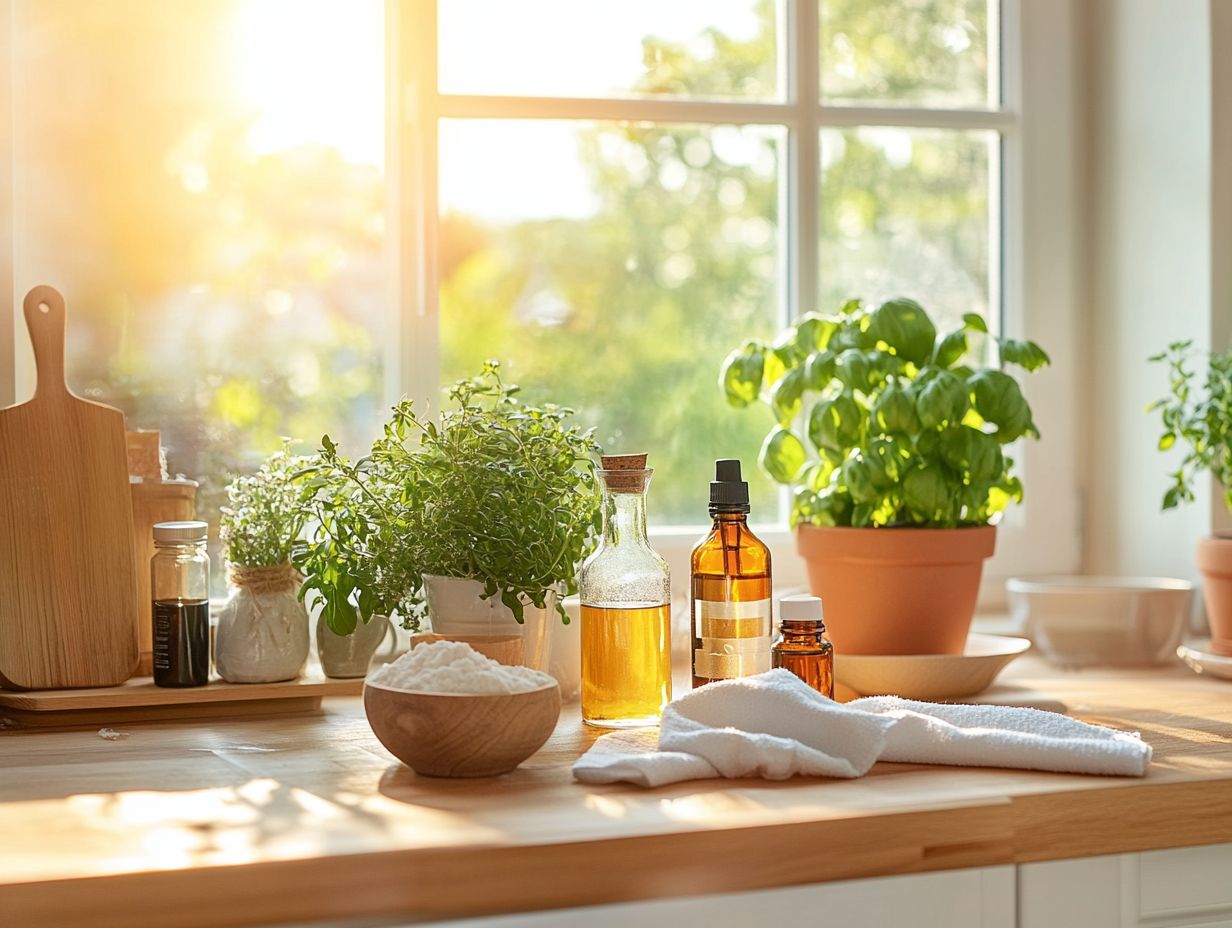
What are the benefits of using green cleaning products?
Green cleaning products are made from natural and non-toxic ingredients, making them safer for both the environment and your health. They help reduce air and water pollution, making them a sustainable choice. Many brands offer eco-friendly tips to enhance their usage.
What are the five essential tips for green cleaning?
The five essential tips for green cleaning are: using natural cleaning products, making your own cleaners, using microfiber cloths, reducing water usage, and properly disposing of hazardous chemicals.
How can I make my own green cleaning products?
Making your own green cleaning products is simple and rewarding! Use natural ingredients like vinegar, baking soda, and essential oils.
Many DIY recipes are available online for different cleaning needs. These natural options can also improve your indoor air quality.
Why is reducing water usage important in green cleaning?
Reducing water usage is vital in green cleaning. It helps conserve our precious water resources.
Fix leaks, use a spray bottle, and only use the water you need for each cleaning task.
What should I do with hazardous chemicals when cleaning?
Dispose of hazardous chemicals, like bleach and ammonia, properly to protect the environment. Check with your local waste management department for safe disposal methods.
How can I ensure my cleaning products are truly green?
Look for third-party certifications like Green Seal or EcoLogo on cleaning product packaging. These labels show that the product meets specific environmental and health standards.
Follow eco-friendly tips from experts like Stephanie Moram to ensure you’re using safe and effective products!

